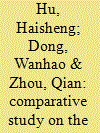|
|
|
Sort Order |
|
|
|
Items / Page
|
|
|
|
|
|
|
| Srl | Item |
| 1 |
ID:
099159


|
|
|
|
|
| Publication |
2010.
|
| Summary/Abstract |
Using data from 1986-2005, the present paper estimates the impact of direct knowledge spilled over from G-7 countries on China's economy. We use telephone line penetration rates and personnel flows to estimate the direct spillover effect. Our results show that direct knowledge spillovers through telecommunication networks and personnel flows are important components of international R&D spillovers in China. These direct channels of spillover effectively accelerate China's economic growth. Therefore, China should invest more in human capital and in its telecommunication network to enhance the absorptive capacity of direct R&D spillovers, and to increase communication with other nations, in particular the USA and Japan. More subsidies to domestic R&D research and purchase of intermediate goods will help to raise China's R&D intensity.
|
|
|
|
|
|
|
|
|
|
|
|
|
|
|
|
| 2 |
ID:
179713


|
|
|
|
|
| Summary/Abstract |
This paper is a comparative study on the effects of a resource tax and a carbon tax. In this paper, we use the computable general equilibrium (CGE) approach to simulate the impact of China's increasing resource tax rate policy and carbon tax policy. The strengths and weaknesses of the two policies are compared from the perspective of energy utilization, air emissions, the macro economy, government tax revenue, household income, and enterprise net profit. A carbon tax leads to a reduction of all kinds of energy consumption. A carbon tax of 1 yuan/ton of CO2 can reduce CO2 emissions by 2100 tons and significantly reduce SO2, NOx, PM2.5, and PM10 emissions. From the perspective of energy utilization, carbon emissions, and pollutant emissions, the effect of a carbon tax is significantly better than that of a resource tax. If the rate of a resource tax rises by 50%, or a carbon tax is levied at the rate of 4 yuan/ton of CO2, China's economy (on a GDP basis) will decline by 0.1%.
|
|
|
|
|
|
|
|
|
|
|
|
|
|
|
|
| 3 |
ID:
125423


|
|
|
|
|
| Publication |
2013.
|
| Summary/Abstract |
The transformation of the energy supply in Germany (the "Energiewende") as described in the German Federal government's 'Energy Concept' ( Energiekonzept, 2010) is based on a political consensus about long-term targets for energy efficiency and renewable energies. The aim of this article is to present a consistent scenario for this transformation process reflecting the long-term implementation of renewable energies and the possible future structure of the German energy system as a whole. Structural and economic effects of this development are derived and discussed. It summarizes results of scenario analyses done by the department of Systems Analysis and Technology Assessment of the German Aerospace Center as part of a three-year research project for the German Federal Ministry for the Environment. The underlying study provides a detailed data base reflecting a long-term roadmap for the energy system transformation in Germany. The scenarios show that the policy targets are consistent and can be achieved, if appropriate policy measures are to be implemented. The economic analysis shows the amount of investments and the strong market dynamics required for new generation technologies but also the huge economic benefits that can result from this development path in terms of fuel cost savings and lower fuel imports.
|
|
|
|
|
|
|
|
|
|
|
|
|
|
|
|
| 4 |
ID:
125020


|
|
|
|
|
| Publication |
2013.
|
| Summary/Abstract |
Various explanations have been advanced for the January effect in the existing literature, but no consensus has been arrived at to distinguish one particular explanation from any others. In this paper, a time-series GARCH-M model with conditional variance as a proxy for market systematic risk is applied to investigate the seasonal effects in four countries with different tax system and tax year end: the USA, the UK, China and Australia. Empirical evidence showed a January effect in the USA, a January and an April effect in the UK, a July effect in Australia and no significant seasonal effect in China. This pattern consistently links to tax year end and the tax system in the sample countries; however, no clear evidence has been found to support the proposition that market risk is higher or priced highly only in calendar months with a seasonal effect. However, to reflect the seasonal effect, an interactive dummy variable is added into the time-series GARCH-M model, and the seasonal effects are explained away. The results of the sampled countries support the proposition that market volatility increases when it is close to the date of financial statement performance due to the uncertainty of the financial information.
|
|
|
|
|
|
|
|
|
|
|
|
|
|
|
|
|
|
|
|
|